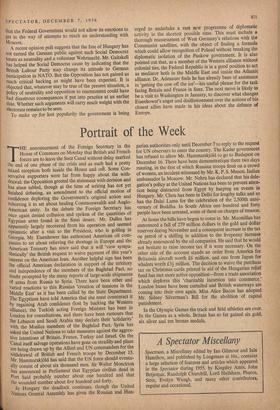Portrait of the Week
THE announcement of the Foreign Secretary in the House of Commons on Monday that British and French forces are to leave the Suez Canal without delay marked the end of one phase of the crisis and as such had a pretty mixed reception both inside the House and out. Some Con- servative supporters were far from happy about the with- drawal; the Opposition greeted the statement with derision and has since tabled, though at the time of writing has not yet finished debating, an amendment to the official motion of confidence deploring the Government's original action and exhorting it to set about healing Commonwealth and Anglo- American unity. In the debate the Foreign Secretary has once again denied collusion and spoken of the quantities of Egyptian arms found in the Sinai desert. Mr. Dulles has apparently largely recovered from his operation and seemed optimistic after a visit to the President, who is golfing in Georgia. Mr. Eisenhower has authorised American oil com- panies to set about relieving the shortage in Europe and the American Treasury has since said that it will 'view sympa- thetically' the British request to waive payment of this year's Interest on the American loan. Another helpful sign has been the official American declaration in support of the territory and independence of the members of the Baghdad Pact, no doubt prompted by the many reports of large-scale shipments of arms from Russia to Syria. There have been other and varied reactions to this Russian `creation of tensions in the Middle East' as it has been called by the State Department. The Egyptians have told America that she must counteract it by regaining Arab confidence (lost by backing the Western alliance), the Turkish acting Foreign Minister has been in London for consultations, and there have been rumours that the Lebanon and Saudi Arabia may declare their 'solidarity' with the Muslim members of the Baghdad Pact. Syria has asked the United Nations to take measures against the aggres- sive intentions of Britain, France, Turkey and Israel. On the Canal itself salvage operations have gone on steadily, and plans are being drawn up by the Allied and UN commanders for the withdrawal of British and French troops by December 15. Mr. Hammarskjold has said that the UN force should eventu- ally consist of about six thousand men. Sir Walter Monckton has announced in Parliament that Egyptian civilian dead in Port Said probably number about one hundred and that the wounded number about five hundred and forty. .
In Hungary the deadlock continues, though the United Nations General Assembly has given the Russian and Hun- garian authorities only until December 7 to reply to the request for UN observers to enter the country. The Kadar government has refused to allow Mr. HammarskjOld to go to Budapest on December 16. There have been demonstrations there two days running, in the first of which Russian troops fired on a crowd of women, an incident witnessed by Mr. K. P. S. Menon, Indian ambassador In Moscow. Mr. Nehru has declared that his dele- gation's policy at the United Nations has been to prevent atten- tion being distracted from Egypt by harping on events in Hungary. Mr. Chou has been in Delhi for lengthy talks and so has the Dalai Lama for the celebration of the 2,500th anni- versary of Buddha. In South Africa one hundred and forty people have been arrested, some of them on charges of treason.
At home the bills have begun to come in. Mr. Macmillan has announced a fall of 279 million dollars in the gold and dollar reserves during November and a consequent increase in the tax on petrol of a shilling in addition to the fivepenny increase already announced by the oil companies. He said that he would not hesitate to raise income tax if it were necessary. On the other side of the account stands an order from America for Britannia aircraft worth £6 million, and one from Japan for whalers worth £M million. The decision to waive the purchase tax on Christmas cards printed in aid of the Hungarian relief fund has met more active opposition—from a trade association which deplores this `charitable incursion into commerce.' London buses have been curtailed and British waterways are coming into their own again. Miss Alice Bacon has adopted Mr. Sidney Silverman's Bill for the abolition of capital punishment.
In the Olympic Games the track and field athletics are over. In the Games as a whole, Britain has so far gained six gold, six silver and ten bronze medals.


































 Previous page
Previous page